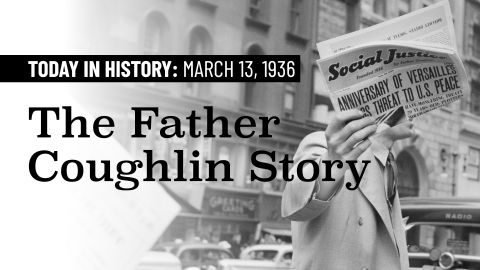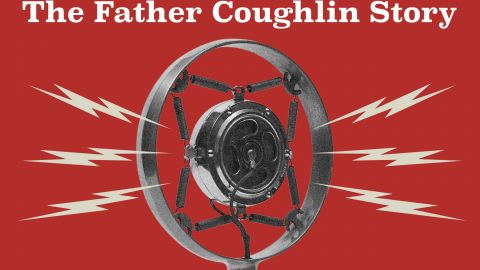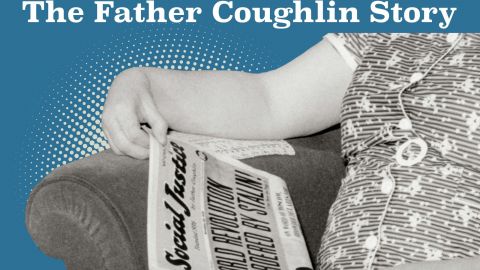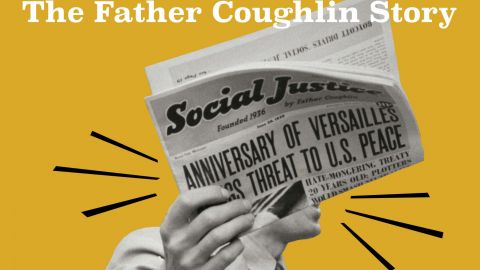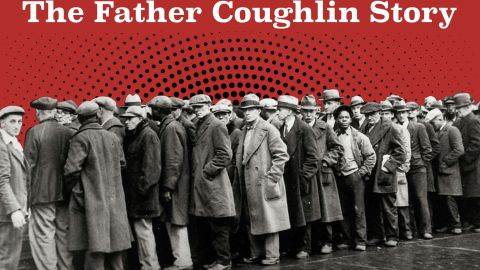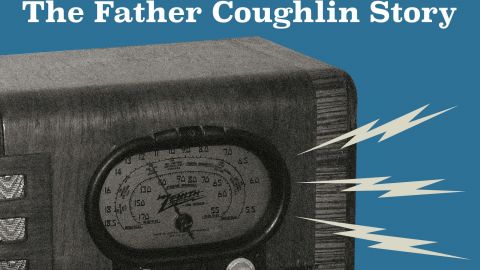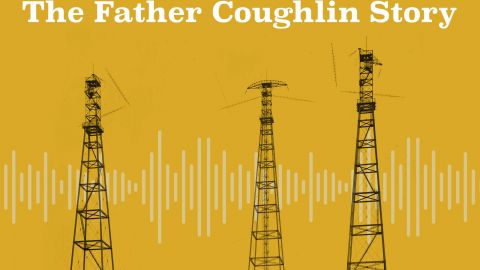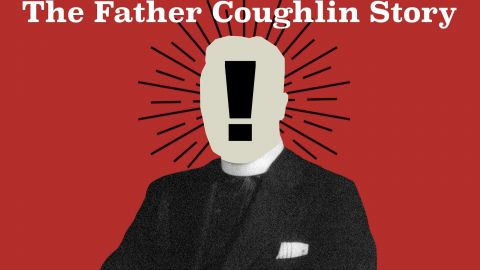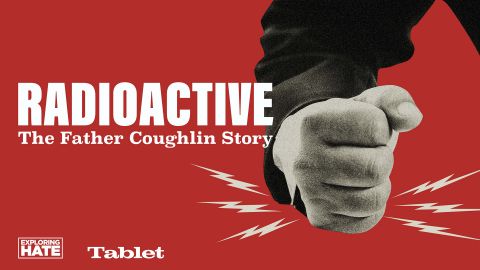The following is a production of Tablet Studios in association with The WNET Group’s reporting initiative, Exploring Hate: Antisemitism, Racism and Extremism, and with support from Maimonides Fund.
Andrew Lapin: When Franklin Delano Roosevelt was elected president in 1932, Father Charles Coughlin felt as if a personal New Deal was soon coming his way. After all, as far as Coughlin believed, he was a major player in FDR’s campaign; a loud voice on the radio, urging his millions of listeners to vote for the candidate he said was more savior than ordinary politician. Now that his man was securely in the Oval Office, it was time to turn that support into the greatest currency in America: political power. Coughlin wanted some kind of token of appreciation from the president. Maybe a cabinet post. Years later, Father Coughlin recounted his version of how close he and FDR had been in the early days of his presidency. “I was with him, I’d say, every two weeks,” he told an interviewer. According to Coughlin, the two were so close that the priest could call upon the president for serious favors. Remembering one visit to the president elect’s New York office, Coughlin recalled speaking to Roosevelt as the latter had his official portrait painted. “‘And that was the day when I said, Well, now listen, you promised me some things and I have only one friend that I have in mind, and his name is Frank Murphy. We need a good man over in the Philippines. How about it?’ And he says, ‘Frank is the governor of the Philippines.’ So that’s how close I was to Mr. Roosevelt.” Except Roosevelt’s camp didn’t exactly share the priest’s version of reality. FDR didn’t need Coughlin in his corner to take down Herbert Hoover. Hoover was the least popular president in American history. Just months before the election, he had ordered federal troops to attack a group of dirt poor World War I veterans in Washington, DC, just for demanding their cash bonuses from the government.
Radio announcer: And the roaring flames sound the death knell [unintelligible] in the shadow of the beautiful dome of the capital of the United States of America.
Andrew Lapin: So FDR didn’t think he owed Coughlin anything. Roosevelt was happy to court Catholic support, but Coughlin’s policies were too right wing for his tastes. The priest had been steadily drifting toward a certain brand of loudmouth populism that was weirding out the White House. The president didn’t want that kind of support. So it would be better, FDR thought, to give this guy a pat on the head, dine with him a couple times as a thank you, and then leave him in the dust. But you ignored Father Coughlin at your own peril. I’m Andrew Lapin and this is Radioactive, an eight part series from Tablet Studios and Exploring Hate about Father Charles Coughlin, the famous radio priest, notorious antisemite, and a man who changed American culture and politics forever.
Episode five: His Cross to Bear. If Coughlin was exaggerating his own importance at the time, he wasn’t off by much. Less than a year after Roosevelt took office, WOR, out of New York, one of the country’s most popular radio stations, asked its listeners who, other than the president, was the most useful citizen of the United States, politically. 55 percent said it was Father Charles Coughlin. Hollywood offered him half a million dollars to play himself in a biopic, an offer he refused for fear it would seem too ostentatious. Even without a Hollywood biopic, 30,000 visitors flocked to his church every Sunday, attending one of eight massive masses, staying at the nearby motel, owned and operated by the Shrine of the Little Flower, and perusing the gift shop run by Father Coughlin’s parents, selling small golden crosses and autographed photos of their very famous son. One young man named John Constable from Geneva, New York, was turned on to Coughlin’s broadcasts by friends concerned that he had begun to absorb too much Socialist doctrine. Constable quickly became hooked on the priest’s good word, especially his conviction that the bankers were the ones responsible for the Depression. Then, one night Constable had a dream of the Virgin Mary appearing before him. She instructed Constable to go serve her son and then a shimmering image of Father Coughlin materialized at his bed. Even though Constable didn’t know what the priest looked like. The next day, Constable resolved to move to Royal Oak, Michigan, and got a job as a maintenance worker at the Shrine of the Little Flower, all to be closer to the priest. When he met Coughlin in person, he instantly recognized the savior who’d visited him in his dream. Constable had become convinced, like many Americans had, that Father Coughlin was the Messiah. Roosevelt wasn’t on board with the whole Messiah thing and certainly wasn’t going to give this guy an official cabinet position. But he did see that the priest was on to something: the power of radio. It wasn’t long before FDR was piggybacking on Coughlin’s greatest innovation and muscling in on his territory.
Radio announcer: Ladies and gentlemen, the President of the United States.
Andrew Lapin: On March 12th, 1933, a mere eight days after his inauguration, President Roosevelt, speaking from the diplomatic reception room at the White House, sat before a radio microphone and delivered the first of what would soon become known as his fireside chats.
FDR: My friends, I want to talk for a few minutes with the people of the United States about banking.
Andrew Lapin: It was the first time a sitting U.S. president would make a direct appeal to the country over mass media.
FDR: Particularly where the overwhelming majority of people who use banks for the making of deposits and the drawing of checks…
Andrew Lapin: On the radio, FDR was no Father Coughlin. Where the radio priest thundered loudly, the president spoke softly. Where the radio priest projected his voice to an audience of millions, the president pretended he was speaking to two or three friends sitting across from him in his den, where the radio priest turned up the drama and got emotional, the president, the quintessentially detached WASP, never raised his voice or lost his cool.
FDR: Because of the fortitude and the good temper with which everybody has accepted the inconvenience and the hardships of the banking holiday…
Andrew Lapin: That, says Roosevelt historian Richard Breitman, was how the president projected the calm he needed to win over working class America.
Richard Breitman: There’s a famous story about after Roosevelt died, his body and coffin went on a train trip and a very common man came to see Roosevelt at Union Station in Washington, D.C., and a reporter asked him, Did you know the president? And the man answered, no. But he knew me.
Radio caller: Dear Mr. President, my name Israel Antman of Bronx, New York. I want to declare myself always ready at all times to do my part.
Richard Breitman: He could speak to people at almost any level and get his message across and get some emotional connection.
Radio callers: President Roosevelt, I am an independent dealer here in Austin. I am John Frawley, an ordinary coal miner. Mrs. William Hamilton of Pittsburgh, Pennsylvania. I welcome this opportunity of pledging my wholehearted support in any small way that I can help.
Richard Breitman: Roosevelt used his first term to lift the country out of the depression, to reduce unemployment and to extend the range of the federal government
Radio caller: In the past year and a half, we have lived in a government housing project and so have lived under much better conditions than we could have privately.
Richard Breitman: He did figure out ways to get across to many millions of Americans who were, if anything, suspicious of his patrician background.
Radio caller: Most of the folks I know around here are 100 percent behind.
Andrew Lapin: Coughlin backed some of the president’s early policies, even referring to the new deal as Christ’s Deal. Soon, however, Coughlin began complaining to his confidantes that the president just wasn’t listening. Instead of being a mouthpiece for Roosevelt, Coughlin started pursuing his own policies on air, even when it meant clashing with members of Roosevelt’s administration. For instance, he wanted to revoke the gold standard.
Charles Coughlin: For the financial system on which we have operated, not only has now decayed, it is now an actual menace, with its crumbling walls, to all our free institutions.
Andrew Lapin: Coughlin began suspiciously eyeing the people who did get FDR’s seal of approval.
Henry Morgenthau: All of this gold will be held in the United States Treasury to protect and maintain the value of our money.
Andrew Lapin: There was one member of his cabinet in particular who was an obsession of Coughlin’s in any Secretary of the Treasury, Henry Morgenthau Jr., the scion of a prominent Jewish family from Manhattan. A Jew in control of America’s money.
Henry Morgenthau: The money system of the country shall be managed for you, to the end of a more steady purchasing power for your dollar will be maintained.
Andrew Lapin: Morgenthau, Coughlin ranted one week on the radio, was selling out the country’s financial interests to shady foreign adversaries, protecting, quote, “international bankers of ill repute,” as well as the interests of, quote, “one billion Orientals rather than allow silver to reign supreme.”
Andrew Lapin: The comment infuriated the president, and FDR actually went to prominent Catholic leaders to tell them that Coughlin wasn’t representing his views accurately. Coughlin continued to use his broadcasts and public speeches to sing FDR’s praises. He told anyone who listen that he alone was the reason why the White House now received hundreds of letters of support from ordinary Americans every week.
Andrew Lapin: But privately, he was growing insecure. In November of 1933, after defending FDR passionately in a speech in front of thousands of cheering fans packed into New York’s famous Hippodrome, the priest sent a telegram to the White House. He was, he said, going the limit in his defense of the president. He expected some sort of reply, some indication that Roosevelt or someone close to him cared enough to invite Coughlin to another White House visit. When no response came, Father Coughlin turned on the president.
Andrew Lapin: Meanwhile, in 1935, German Chancellor Adolf Hitler had begun to aggressively violate the terms of the Treaty of Versailles. He was ramping up the German arsenal and preparing to pass the Nuremberg Laws, which would divide Nazi society into two groups: the pure-blooded Aryans, and everybody else. There was growing pressure on the U.S. to do something about the Nazis. The president still wasn’t quite ready to jump into battle with painful memories of World War One still on America’s mind. Roosevelt began to ease back into international diplomacy by pushing to have the United States join the World Court, a move that the president’s isolationist foes bitterly opposed.
Andrew Lapin: This was where FDR, the phenomenally popular New Deal president, first began to make some serious enemies. Here’s Breitman again.
Richard Breitman: The isolationists were quite strong. Looking back at World War I and saying, how can we prevent an active president from dragging us step by step into another war?
Andrew Lapin: Less than 48 hours before the Senate held its vote on whether to join the World Court, Father Coughlin took to the airwaves. The man who had once told his millions of listeners that it was Roosevelt or ruin, was now singing a very different tune. Roosevelt and Ruin. “My friends,” he began his address, “if I am properly informed, Tuesday of this week, Tuesday, January 29th, will be remembered by our offspring as the day which overshadowed July 4th. The one date with our independence. The other with our stupid betrayal. Today, tomorrow may be too late, today, whether you can afford it or not, send your senators telegrams telling them to vote no on our entrance into the World Court. Keep America safe for Americans and not the hunting ground of international plutocrats.” Almost immediately, 40,000 telegrams poured into the Senate building, so many they had to be wheelbarrow old and then the votes were counted and FDR’s team was shocked to learn that the president had taken a beating. Legislators had sided with the isolationists. Father Coughlin had prevailed. America would stay out of the World Court, an arrangement that continues to this day. And the radio priest, who until very recently had been the president’s loudest cheerleader, was now his most dangerous foe.
Andrew Lapin: The president decided he had to retaliate. In March of 1935, he sent one of his top advisers, New Deal official General Hugh Johnson, to slam Coughlin on the radio. And while the president was always calm and chatty when on air, the general was instructed to give Father Coughlin a taste of his own medicine. “Someone sent me a parallel of what both you and Adolf Hitler proposed and preached, and they are as alike as peas in a pod,” General Johnson said in his address. “As a foreign born, you could not be president, but you could be a Reichsführer, just as the Austrian Adolf became dictator of Germany. You have not chosen the swastika. You have a more sacred device… No swastikas for Nazis–but a cross!” Coughlin, of course, was ready with a rebuttal.
Charles Coughlin: 1776 Washington and Jefferson and their compatriots had hauled up them lies and charges and the epithet of revolution. Their lands were overtaxed. Their laborers and farmers have been exploited. Their liberties have been denied. Their right to free speech on a petition had been scoffed at. They were called revolutionary. So are you. Thank General Johnson, the cream puff general, the chocolate soldier, for classifying you with Washington and Jefferson and the men of Lexington and Concord. General Hugh Johnson, who never faced an enemy and never successfully faced an issue?
Andrew Lapin: The United States government was accusing Father Coughlin, the biggest radio star in the country, of being an anti-Semite. All that talk of international bankers struck many as a not-so-veiled attack on Jews, and Father Coughlin didn’t help his case much when, railing against the gold standard, he delivered a speech about the Rothschild family, accusing wealthy Jews of starting wars so that they could seize all of the world’s most precious metals. As his profile grew more prominent and his critics grew louder, Father Coughlin refined his message. It wasn’t Jews he hated, it was Bolsheviks, Communists, the Red Menace, those godless meddlers over there in the Soviet Union who wanted to dethrone liberty, freedom and capitalism itself, who held no loyalty to any one nation but instead wanted to destroy all nations and a group that just so happened to be composed largely of Jewish people.
Charles Coughlin: It is perplexing to find that these so-called German bankers, who dominated the government and its officials, were often times Jewish international bankers. Germany was their residence, but the world was their home.
Andrew Lapin: The good Jews, religious ones, patriotic ones, anti-Communists were fine. It was only the bad Jews, the Red ones he despised. Father Coughlin had pivoted his messaging and was now parroting the well-worn conspiracy theory known as Judeo-Bolshevism.
Paul Hanebrink: Judeo-Bolshevism is a variation on the age old idea of a Jewish conspiracy or a Jewish plot.
Andrew Lapin: Paul Hanebrink is a history professor at Rutgers University who has studied the myth of Judeo-Bolshevism.
Paul Hanebrink: There have been a number of variations on this conspiracy myth, this conspiratorial form of anti-Semitism over the centuries. In the 20th century, the most potent form of it was the myth of Judeo-Bolshevism, which had it that Jews had created Communism and dominated Communist parties in order to use Communism to further their own will to power. The myth of Judeo- Bolshevism also builds on some very old ideas about the way in which Jewish power is seen as being a kind of a symbol for disorder or dystopia. So the fear that Jews are coming to power immediately allows people to indulge in all sorts of nightmarish fantasies about what that would mean.
Andrew Lapin: Several of the Detroit Jewish communities most prominent leaders accepted Father Coughlin’s distinction between the good Jews and the bad. In an interview with the community newspaper, Father Coughlin stated that he was, quote, “a friend and champion of the Jewish people,” and two of the leading rabbis at the time spoke at the priest’s massive rallies. When a prominent Detroit rabbi, Leon Fram, loudly denounced Coughlin’s rhetoric as bad for the Jews, he was criticized in his community for creating a needless panic. But ordinary Jews listening in weren’t so sure. Guy Stern, a decorated World War Two veteran who today is an emeritus scholar at the Holocaust Memorial Center of Farmington Hills, Michigan, escaped Nazi Germany when he was just 15 years old. To him, this all sounded a little too familiar. As a kid, Guy had heard Nazis targeting Jews with their radio propaganda.
Guy Stern: At first, it was not, let’s say, like broadcast completely devoted to the denigration of the Jews. But it slipped in. There were slogans that were repeated subtly time and again in other broadcasts. One of them was “Die Juden sind unser Unglueck.” Jews are our misfortune. And that was frequently repeated.
Julius Streicher: Die Juden sind unser Unglueck. Die Juden sind unser Unglueck. Die Juden sind unser Unglueck [APPLAUSE].
Andrew Lapin: Now, Guy was in America living with relatives in St. Louis. When he walked through the streets of his neighborhood on Sunday afternoons, he would hear Father Coughlin’s voice coming out of the radio.
Guy Stern: I was taken aback when I heard Father Coughlin and I thought, Well, I parted with all that when I left Germany. I did not project that America would be misled in the same way by demagogic slogans and propaganda the way it had happened in Germany.
Andrew Lapin: And yet neither Guy nor his family could stop listening to Coughlin.
Guy Stern: My aunt and uncle were, of course, outraged, but it also was something they wanted to hear because the accusations sometimes struck close to home and soul. Father Coughlin was a steady diet.
Andrew Lapin: Even people appalled by Father Coughlin couldn’t stop listening to him. As he and so many other political figures of the time were demonstrating, outrageous behavior could forge a path to victory. For Coughlin, sniping at FDR on the air was fine. But if he wanted a real victory over his opponent, the priest had to gain some political power. And to do that, he needed a political party. And so was born his massive movement, an organization that counted millions of Americans as members and galvanized other demagogs to join forces and spread their message across the country: the National Union for Social Justice. Finally, someone to fight for the working man, the forgotten American.
Charles Coughlin: The Depression still waxes strong as the powers of deflation reached out to confiscate homes, to capture farms, and to keep that ever marching army of jobless upon our streets, wondering when God in His mercy would lift His hand? I dared you and challenged you to organize so that the people, if not the president, would drive the money changers from the temple. And you did it.
Andrew Lapin: Next week, with a little help from his famous friends, Father Coughlin’s Social Justice Party faces off against the president. Radioactive is hosted by me, Andrew Lapin, and is a production of Tablet Studios in association with The WNET Group’s reporting initiative Exploring Hate: Antisemitism, Racism, and Extremism, and with support from Maimonides Fund. The show was produced and edited by Josh Kross and Robert Scaramuccia with Quinn Waller. Our managing producer is Sara Fredman-Aeder. Our executive producers are Liel Leibovitz and Stephanie Butnick. Our theme music is from the Ghostwriter and was composed by Alexandre Desplat. All speeches and material of Father Coughlin are authentic to the source, as well as music and other audio from his radio program. This episode was recorded at Michigan Radio, Ann Arbor’s NPR station. Our recording engineer is Peg Watson. Special thanks this episode to Jennifer Guerra, Sarah Hulett, Guy Stern and the Holocaust Memorial Center of Farmington Hills, Michigan. To learn more about the fascinating life of Guy Stern, pick up his memoir, Invisible Ink, available wherever books are sold. Please go rate and review us wherever you listen to podcasts. For more information about the show, please visit tabletmag.com/radioactive.
Major funding for Exploring Hate has been provided by: The Sylvia A. and Simon B. Poyta Programming Endowment to Fight Antisemitism, Sue and Edgar Wachenheim III, Charlotte and David Ackert, The Peter G. Peterson and Joan Ganz Cooney Fund, and Patti Askwith Kenner. For a complete list of funders, please visit pbs.org/exploringhate.

